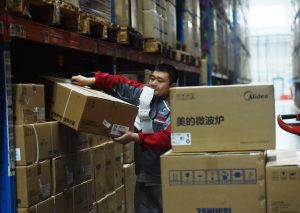The Chinese economy is, arguably, more imbalanced than ever. The continuous stream of facts and arguments from people like Michael Pettis and Brad Setser show this beyond any doubt. In the context of China’s state-steered economic system, this imbalance is not a coincidental outcome of domestic and international market circumstances. Instead, it is a direct result of political decisions.
The Chinese government prioritizes political security above all else and implements a growth model that supports this goal. This inherently entails a preference for investment and exports over consumption. The logic is simple: Investment and exports can be more directly controlled by the state than consumption. In consequence, China simply can not rely on consumption under its current political system. While the details of China’s economic model are well known, the fact that this model is an intentional outcome of the country’s political institutions receives much less attention. Here, four dynamics are critical.
First, growth is not always the dominant state priority, as it coexists with frequently conflicting political security concerns. The need for political security entails, for example, China’s well-known measures to control the population and oppress labor, such as the hukou system, banning labor unions and strikes, closing the capital account, and repressing interest rates on savings. This translates into lower wages and suppressed domestic consumption.
Prioritizing political security also entails an emphasis on sources of growth that can more easily be controlled by the government – namely investment, through state capital, and exports, by subsidizing manufacturing. Repressing consumption while supporting investments and exports is, of course, directly compatible and mutually reinforcing.
Prioritization of political security also stifles economic reforms and lowers government efficiency. In a return of a sarcastic slogan from the Mao era, the government’s preference for high-level policymakers is, once again, “better red than expert.” This means that the government is willing to sacrifice competent economic management for political loyalty, and will only support growth that is compatible with control of the citizenry.
Second, the growth model is based on the interests of the dominant political coalition around the central government. These interests include maximizing their own economic gain, increasing the country’s international power, and maintaining continuous political control. The coalition is made up of high-level central government state bureaucrats, managers of centrally owned state-owned enterprises (SOEs), and the members of CCP’s Central Committee.
While powerful alternative coalitions have existed in the past, their influence is smaller today. The downfall of these coalitions is personified by Jack Ma (representing private sector interests), Bo Xilai (representing local governments), and Hu Jintao (representing another intra-party faction). This means that China’s economic policy is designed to specifically serve the political and economic interests of this central political coalition, with little ability of particular regions or industries to oppose economic policies.
Third, China’s political institutions mean that the government faces few restrictions on policymaking. They do not have to grapple with electoral or institutional-legal constraints, such as independent central banks or “golden rules” on the use of macroeconomic policies, which constitutes effective state capacity in the pursuit of a preferred growth model. This allows China to use macroeconomic tools that would be difficult or impossible to use in democracies, such as financial repression, a closed capital account, and using monetary policy toward non-orthodox goals. In a democracy, it would be hard to imagine getting electoral support for policies that voters lose from in so many ways – few would be willing to sacrifice improvements in public healthcare, for support toward exporting cars. This capacity itself does not imply a preference against consumption, but allows this already existing preference to be effectively pursued.
Fourth, the Chinese government’s political ideology is opposed to the state providing extensive welfare benefits. Xi Jinping himself declared that in Latin American countries, “high levels of welfare created a generation of lazy people that would not work, resulting in an unsustainable fiscal burden and the middle-income trap,” while in Scandinavian welfare states, “over-welfarism has resulted in an undynamic society.” Unsurprisingly, the government’s limited provision of welfare services is itself an impediment to household consumption, as ordinary citizens must save to cover the costs of education, healthcare, elder care, and other social expenses. This means that extensive government consumption – another type of consumption – is also out of the question.
Together, these four dynamics mean that China’s politics effectively make consumption-led growth impossible, necessitating instead a reliance on investment and exports. For the same reasons, it is politically impossible to rebalance China’s economy. While China under Hu Jintao gradually increased household consumption, Xi’s greater emphasis on political security has led to a doubling down on investment and exports.
This is why recent measures to promote consumption have not worked. They are not intended to work. Short-term consumption vouchers are not a solution to a structural problem. China may want to recover a few percentage points of consumption lost since COVID-19, but does not intend to restructure its economy. As the logical consequence of the argument made here, such a restructuring can only take place if China’s political system is reformed first – and such reform is unlikely.

































